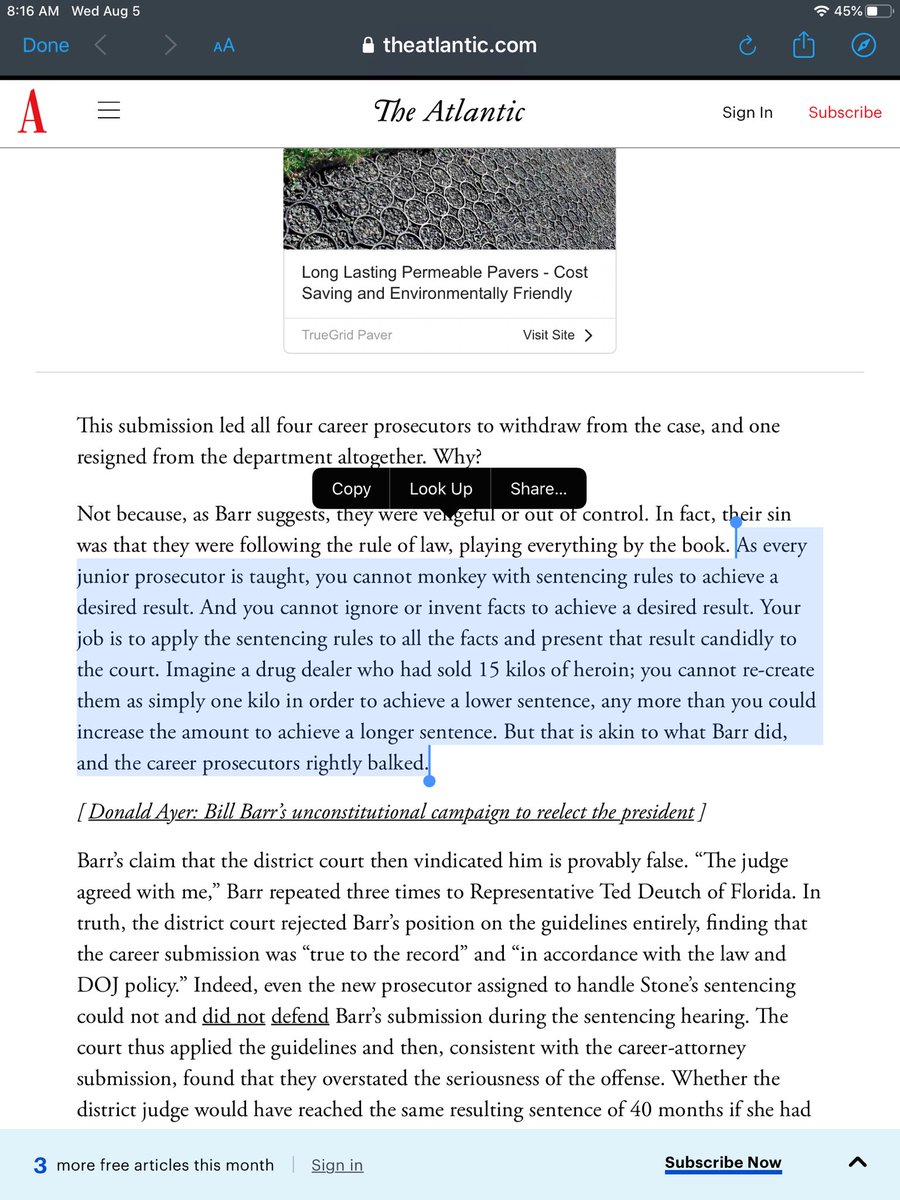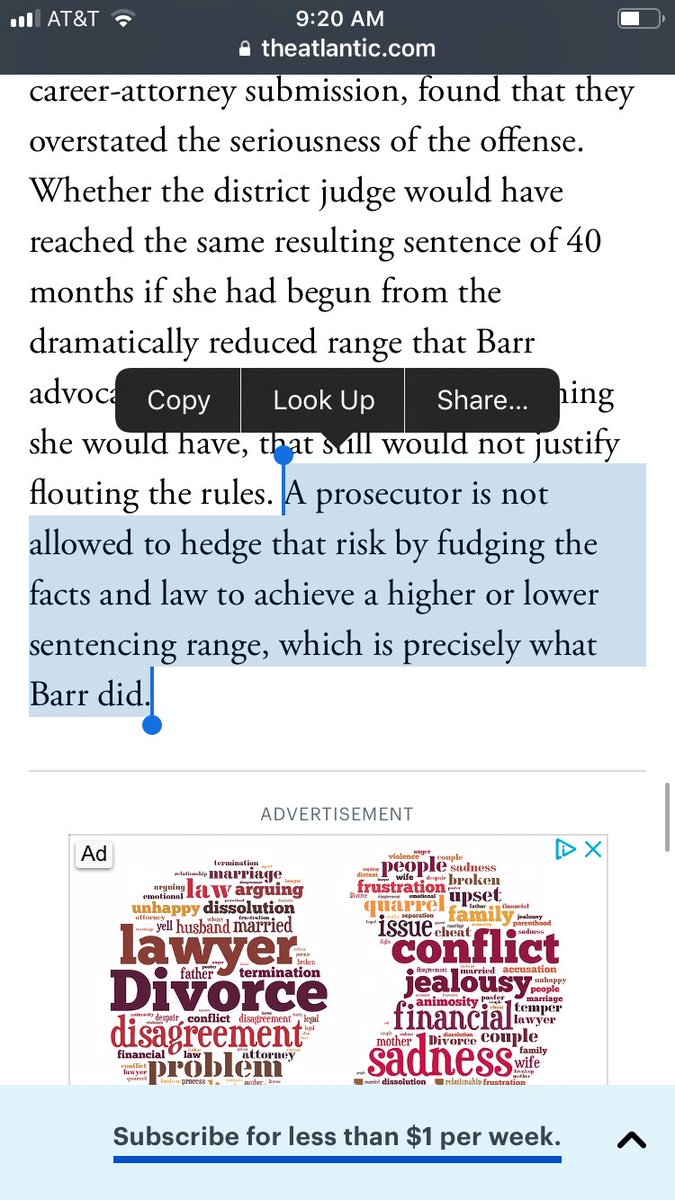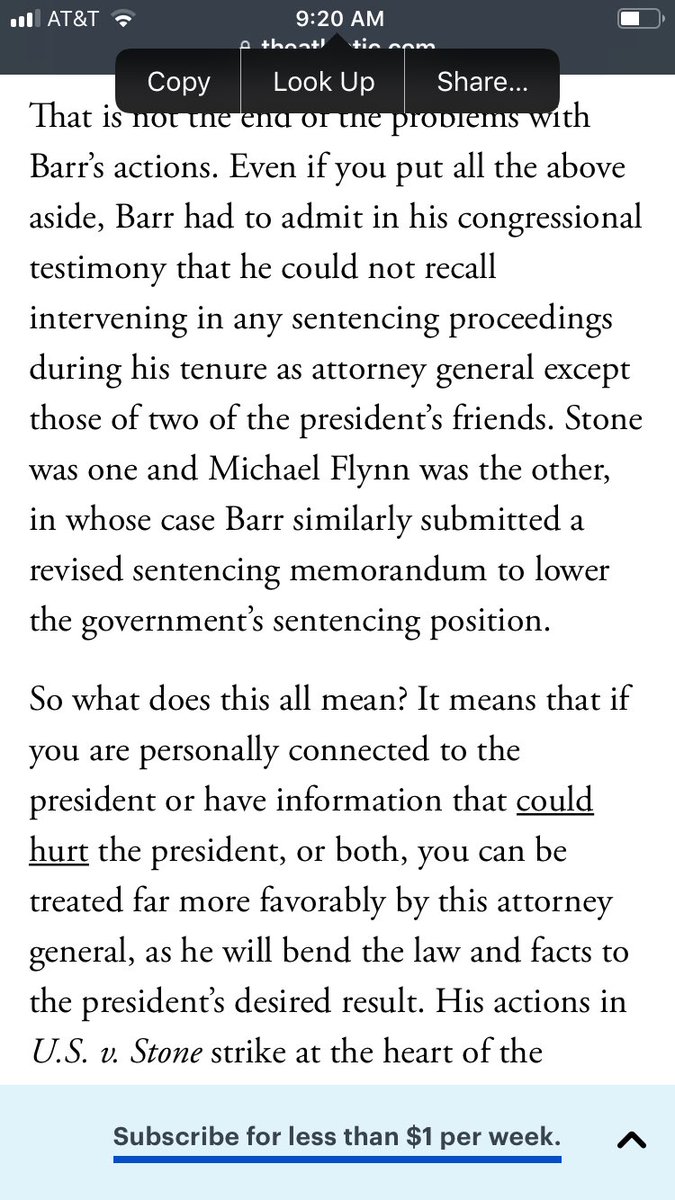This passage from @AWeissmann_ in the Atlantic is astounding. The idea that prosecutors “cannot ignore or invent facts” to ensure that a defendant receives a certain sentence is so entirely at odds with what routinely happens in criminal cases, I can’t believe he said it.
The error in this passage isn’t just an ambiguity or overstatement. Weissmann says that pretending as though the facts of a case were less serious than they actually were isn’t permitted because prosecutors can’t lie and say facts were more serious. But that argument is crazy.
As a constitutional matter, prosecutors have great power to be lenient. When they refuse to indict, dismiss charges, and offer favorable plea bargains, their power in these matters isn’t absolute—but it’s awfully close.
Their power to be harsh, on the other hand, is more limited
Their power to be harsh, on the other hand, is more limited
A major limitation on prosecutorial power is that the charges they bring and the arguments they press in court have to be supported by probable cause. And that’s a serious problem for Weissmann’s argument—a prosecutor can’t say a person had 30 kg of drugs when they only had 15
But that probable cause limitation doesn’t prevent a prosecutor from saying a defendant had 1 kg of drugs when he actually had 15kg. That he had 14 more kg doesn’t make it false to say that he had 1kg—so the 1kg claim is supported by probable cause.
So there’s no doubt that, as a legal matter, prosecutors are permitted to say facts were less serious in order to achieve a particular sentencing outcome. At the same time, they aren’t legally permitted to say facts were more serious.
So one might think Weissmann is making a practical point--namely that prosecutors don& #39;t do this in practice, even if they are legally permitted to do so.
Again, that is completely false.
Again, that is completely false.
It is quite common for prosecutors (often in cooperation with defendants) to manipulate the facts of a case to get a lower sentence. It& #39;s so common that there are phrases that we use to describe the practice:
"fact bargaining"
"charge bargaining"
"swallowing the gun"
"fact bargaining"
"charge bargaining"
"swallowing the gun"
Now, perhaps Weissmann was referring to DOJ policy. Both DOJ and the US Sentencing Commission have (at least at times) said these sentencing practices are wrong. But the practices have nonetheless continued. Here& #39;s an account by Judge Gleeson: https://law.hofstra.edu/pdf/academics/journals/lawreview/lrv_issues_v36n03_bb1_gleeson_36_3_final.pdf">https://law.hofstra.edu/pdf/acade...
Despite all this Weissmann says that the major flaw with Barr& #39;s behavior re the Stone sentencing was that DOJ lied about sentencing facts.
But that is just not true. Read the revised memo yourself. It doesn& #39;t dispute any facts from the career prosecutors: https://www.cnn.com/2020/02/11/politics/roger-stone-sentencing-memo-updated/index.html">https://www.cnn.com/2020/02/1...
But that is just not true. Read the revised memo yourself. It doesn& #39;t dispute any facts from the career prosecutors: https://www.cnn.com/2020/02/11/politics/roger-stone-sentencing-memo-updated/index.html">https://www.cnn.com/2020/02/1...
DOJ& #39;s revised stance at sentencing was that the Guidelines sentence was too harsh and that the judge should impose a lower sentence.
And frankly, that& #39;s true. The Guidelines are usually too harsh. And they were too harsh in this case too.
And frankly, that& #39;s true. The Guidelines are usually too harsh. And they were too harsh in this case too.
In other words, DOJ did not, as Weissman said, fudge facts and law. Instead, they argued that a lower sentence was appropriate.
Does that mean there’s nothing wrong with what happened in the Stone case? Of course not.
DOJ routinely tells prosecutors that they shouldn’t argue for lenient sentences. And Barr admitted that he’s only interfering in cases involving the President’s friends.
DOJ routinely tells prosecutors that they shouldn’t argue for lenient sentences. And Barr admitted that he’s only interfering in cases involving the President’s friends.
That Barr is only intervening for President Trump’s friends is awful. It smacks of corruption and it violates the principle of equal justice under the law. But Weissmann treats it almost as an afterthought in this essay. His major claim is about factual manipulation.
I don& #39;t know how Weissmann could have gotten his critique of Barr and the Stone sentencing so wrong.
His statement that DOJ manipulated facts and law is false. And the idea that prosecutors aren& #39;t permitted to engage in such manipulation is both legally and factually wrong.
His statement that DOJ manipulated facts and law is false. And the idea that prosecutors aren& #39;t permitted to engage in such manipulation is both legally and factually wrong.
Perhaps he& #39;s too close to this particular case.
Perhaps he thought a "rule of law" critique of Barr would be more impressive than a critique about corruption or cronyism.
Or perhaps he didn& #39;t think people would question his representation of what prosecutors can do
Perhaps he thought a "rule of law" critique of Barr would be more impressive than a critique about corruption or cronyism.
Or perhaps he didn& #39;t think people would question his representation of what prosecutors can do
Whatever the reason, the shortcomings in this article are obvious, and they are deeply problematic. Weissmann now holds a position at a well respected center at NYU ( @nyucrimlaw) -- a center that has done great work exposing the raw power that prosecutors have in our system
I hope that Weissmann clarifies or retracts some of the statements in this essay. Because it misleads the public about what prosecutors can and will do at sentencings. Since the primary check on prosecutors is political, the public needs to be better informed.
Finally, I wish that the media would stop relying so heavily on former prosecutors in their coverage of the Trump administration. As @jedshug @JohnFPfaff and others have pointed out, relying so heavily on proescutors skews media coverage of the justice system.

 Read on Twitter
Read on Twitter




